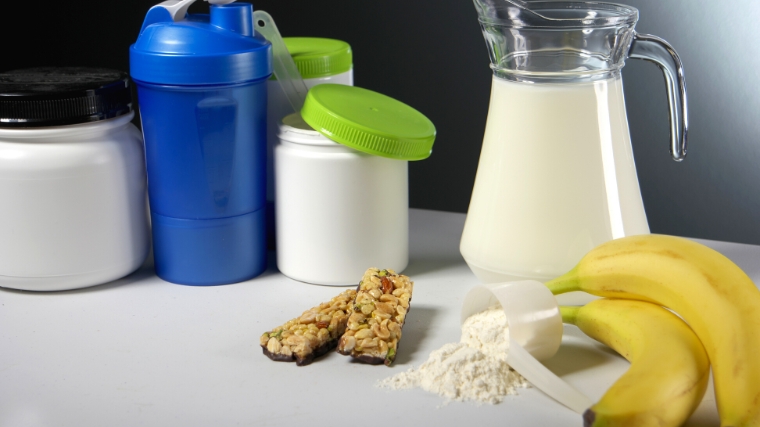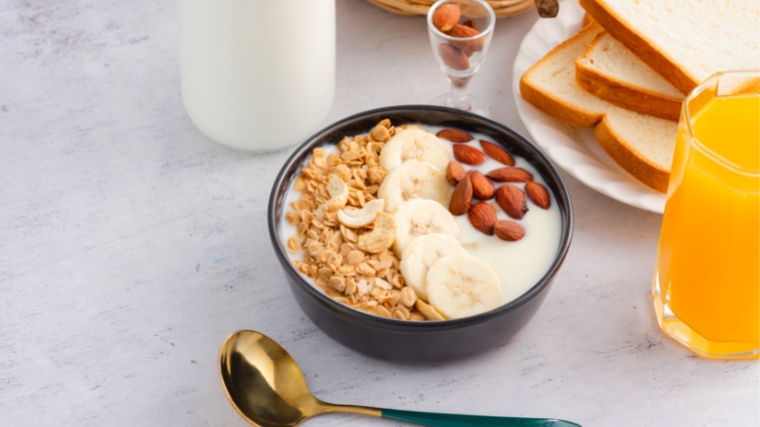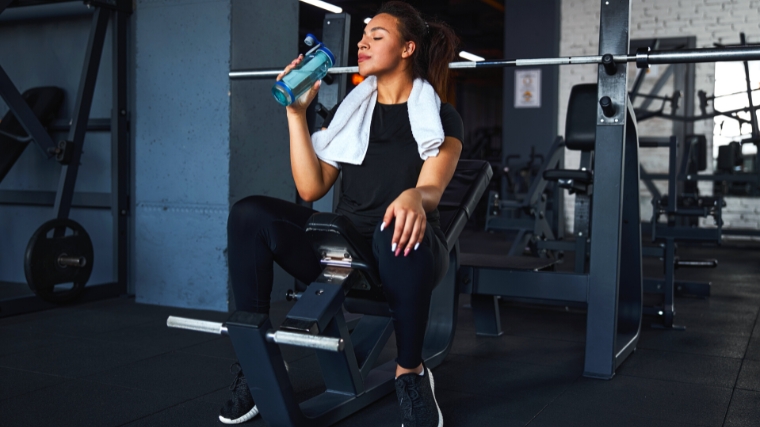Whether you’re looking to bust through an old plateau or start a new program off right, you’re ready to keep on crushing your workouts. Time for a little bit of pre-workout to fuel your body to perform its best in your session.
Pre-workout supplements can give you just the boost of focus and energy you need before hitting the weight room. But they can be pricey. If you’re looking for a natural way to fuel up or you just want to try something different, pre-workout supplement alternatives in your daily diet can do the trick.

It’s all about combining the right macronutrients with what kind of workout you’ll be doing and your meal timing. But it can be a bit daunting to choose the right high-quality foods and beverages to have before you train. Read on for the best alternatives to get those gains without breaking the bank on pre-workout supplements.
Editor’s Note: The content on BarBend is meant to be informative in nature, but it should not be taken as medical advice. When starting a new training regimen and/or diet, it is always a good idea to consult with a trusted medical professional. We are not a medical resource. The opinions and articles on this site are not intended for use as diagnosis, prevention, and/or treatment of health problems. They are not substitutes for consulting a qualified medical professional.
- What Is Pre-Workout?
- What Is a Pre-Workout Supplement Alternative?
- Best Pre-Workout Supplement Alternatives
- What to Avoid in a Pre-Workout Supplement Alternative
What Is Pre-Workout?
Pre-workout is a supplement you can take before your workout that’s meant to boost your training performance. Whether you consume an actual supplement or a food-based alternative, the idea is to enhance feelings of energy, reduce fatigue, and improve exercise performance. (1)

While pre-workout supplements can be quick and efficient, it’s possible to achieve the desired effects through a combination of nutrients ingested in whole foods and beverages.
Ingredients
Pre-workout supplements can contain all kinds of ingredients which vary greatly from brand to brand. Most frequently, pre-workout supplements include beta-alanine, caffeine, citrulline, tyrosine, taurine, and creatine. (2)
If you are looking for a more natural pre-workout to boost your energy, you can opt for natural ingredients including green tea extract. There are also non-stim pre-workouts on the market if caffeine tends to give you the jitters.
[RELATED: Best Pre-Workout Supplements]
What Is a Pre-Workout Supplement Alternative?
When it comes to alternatives to pre-workout supplements, think basic whole foods. Knowing what to eat before your workout can give you a burst of energy to sustain your body through different types of training sessions.

You just need to ingest the right combination of macro and micronutrients, timed correctly before a workout. This method may enhance recovery and tissue repair, as well. (3)
So, which nutrients from whole foods can go into a great pre-workout supplement alternative? Let’s dive in.
Carbohydrates: Simple vs. Complex
Carbohydrates — and the glucose your body gets from them — are one of the main sources of energy. Properly timed, you can use carbs as a pre-workout supplement alternative. For short and high-intensity exercise, your body uses glycogen as its main source of energy. (3) As such, ingesting carbohydrates before a workout can improve performance. (4)
There are two main types of carbohydrates — simple and complex. Simple carbohydrates have a bit of a bad wrap across much of diet culture, but “simple” here just refers to carbohydrates that are made up of less molecules than complex carbs.
The bad reputation may come from thinking of simple carbs as candy and other processed sugars. But you can also get them from whole food sources, like fruit.
Simple carbs are made from one or two sugars, while complex carbs are made up of three or more. (5) Complex carbs take longer to digest, and therefore have a gradual impact on blood sugar levels.
On the other hand, simple carbs digest quickly, spike your blood sugar, and provide a quick source of energy. This makes them an ideal option for a pre-workout snack 30 to 60 minutes before you train.

Complex carbs can also work as a pre-workout supplement alternative, but you’ll need to time your meal to have it two to three hours before your workout starts. That way, your body will have time to digest it, and then use it for energy.
Protein
Protein itself isn’t a direct source of energy for your body to use during a workout, so you may want to save your protein-rich shake for after training. However, ingesting some protein with carbohydrates can be beneficial prior to training. This combination can help increase muscle protein synthesis and give you extra amino acids to help boost recovery. (6)
Fats
Fats can be used as a source of energy for low and moderate-intensity exercise. (7) Combining a small amount of fat, protein, and carbs together makes a great pre-workout supplement alternative. You can play with the ratio of macronutrients in your pre-workout snack or meal by getting specific with the type of exercise you’re going to do.
Short duration and high intensity? More carbs. If you’re doing something with a longer duration and moderate intensity, carbs will still be beneficial — but you may want to include a bit more fat.
Best Pre-Workout Supplement Alternatives
Utilizing whole foods to create pre-workout meals, snacks, or beverages is a great alternative to supplements. Here’s a list to get you started.
Utilize any of these pre-workout supplement alternatives as you see fit depending on what’s available to you, your goals, and how your body tends to react to different foods.
Caffeine
Caffeine has been shown to improve performance and endurance during prolonged, heavy training. (8) It also enhances short-term, high-intensity workouts and helps increase concentration and alertness while reducing fatigue. (8)
While it does come in a supplemental pill form and in traditional pre-workout mixes, you can alternatively get caffeine from these quick, accessible beverages.
- Coffee
- Green tea
- Black tea
- Energy drinks
Try drinking one of these beverages 30 to 45 minutes before your workout.
Water
You may not think of water as a pre-workout, but don’t underestimate the power of hydrating properly before training. Drinking water before exercise can improve performance and help out with heart rate recovery. (9) If you sweat a lot, drinking water is also helpful to prevent dehydration.

Chugging some water alone before you train may not give you much of an energy boost, but it’s helpful to include with the rest of your pre-workout.
Simple Carbs
When it comes to choosing simple carbs for a fast digesting, quick burst of energy, think whole fruits. Simple carbs will provide you a quicker burst of energy than complex carbs that require more time to digest. Plus, fruits that contain water will help hydrate you as well.
- Apples
- Bananas
- Berries
- Pineapple
Try snacking on one of these simple carbs 30 to 60 minutes before your workout for optimal results.
Complex Carbs
If you can eat two to three hours before you train, complex carbs are a great option to help you sustain energy throughout your session. They take longer to digest, so be sure to give yourself enough time for their energy boost to help you out.
- Oatmeal
- Brown rice
- Sweet potato
- Whole grain bread
Pay attention to how your body responds to different foods during your workout. If you have gastrointestinal issues, you may not want to stick with simple carbs instead of more complex ones.
Nut Butter
Nut butter is a great source of fat, has a little protein, and can be combined with a carb source for a pre-workout supplement alternative snack.
- Nut butter + banana
- Nut butter + whole grain toast
- Nut butter + oatmeal
- Nut butter + celery
You can also toss nut butter or some peanut butter powder into your pre-workout smoothie.
Greek Yogurt
Greek yogurt is a high-protein yogurt that comes in dairy and non-dairy options. It has probiotics, which can give you some gastrointestinal benefits. You can opt for a full-fat or lower-fat version, depending on your needs.
- Greek yogurt + banana
- Greek yogurt + berries
- Greek yogurt + apples
- Greek yogurt + oatmeal
If you don’t want too much added sugar, choose a plain variety and add your own fruit for natural sweetness. It’s best combined with a quick-digesting carb source for a great pre-workout alternative.
Smoothie
The smoothie: this is a classic pre-workout source for a reason. Smoothies are an effective, convenient way to get a bunch of nutrients at once, both before and after a workout.
A smoothie doesn’t need to have a powdered supplement in it to be effective. In fact, it may be better to save your protein powder for after your workout, anyway. You can make a smoothie with a few carbs, fat, and some protein for a great pre-workout supplement alternative.

Below are some sample smoothies for before your workout. Or, try subbing ingredients for other fruits or vegetables you like better. Smoothies are also a great place to get extra greens in. A small amount of avocado could make a great addition if you’re looking for more fat in your pre-workout to sustain a low to moderate-intensity session.
- Frozen banana + nut butter + cinnamon + dairy-free milk
- Frozen berries + Greek yogurt + cinnamon
- Frozen spinach + frozen banana + dairy-free milk
- Frozen kale + frozen pineapple + Greek yogurt
- Half avocado + blueberries + Greek yogurt
Tip: frozen fruits and veggies will give your smoothie a thicker consistency, but fresh fruit is also a solid addition.
Choose Your Own Combo
You can create small meals or snacks by combining any of the above ingredients, or by choosing your favorite options that fit each category. Remember to change up your ratio of carbs and fat, depending on what type of workout you’re trying to fuel.
- Whole grain toast + eggs + blueberries
- Whole grain toast + peanut butter + banana
- Sweet potato + spinach + tofu
- White or brown rice + kale + grilled chicken, tofu, or turkey
Keep the protein moderately low, emphasizing it after your workout and throughout the rest of your day.
What to Avoid in a Pre-Workout Supplement Alternative
When you’re putting together your pre-workout supplement alternative, avoid anything that might aggravate your gastrointestinal tract. Bland, easily digestible foods may work best for many people before a workout. But each individual is different.
Try to avoid the following foods pre-workout to help you feel your best during your session.
- Fast food and other highly saturated fat foods
- High-fiber foods and cruciferous vegetables
- Soda and other carbonated drinks
- Highly spicy or saucy meals
These foods aren’t “bad” in and of themselves. But they might be too filling, gaseous, or otherwise tougher on your digestive system to be comfortable before a workout. That bloated feeling during a workout can give some people cramps and make them feel not at their best.

Take some time to figure out which foods work best during your daily routine. Consider jotting down how your body feels 30 minutes, an hour, two hours, three hours, and six hours after eating a particular food or meal. This can help you create the most specific food plan to fuel you while keeping your stomach comfortable.
Fuel Up on Whole Foods
Getting a quality energy boost from your pre-workout doesn’t have to mean expensive supplements or tons of chemicals. Be specific about what type of workout you’re doing and adjust your macronutrients accordingly.
If you want an alternative to supplements, combine carbs, protein, and fat from whole food sources in different ways to fuel up before you hit the gym — and save your protein shake for later.
References
1. Tinsley GM, Hamm MA, Hurtado AK, Cross AG, Pineda JG, Martin AY, Uribe VA, Palmer TB. Effects of two pre-workout supplements on concentric and eccentric force production during lower body resistance exercise in males and females: a counterbalanced, double-blind, placebo-controlled trial. J Int Soc Sports Nutr. 2017 Nov 28;14:46.
2. Jagim AR, Harty PS, Camic CL. Common Ingredient Profiles of Multi-Ingredient Pre-Workout Supplements. Nutrients. 2019 Jan 24;11(2):254.
3. Kerksick CM, Arent S, Schoenfeld BJ, Stout JR, Campbell B, Wilborn CD, Taylor L, Kalman D, Smith-Ryan AE, Kreider RB, Willoughby D, Arciero PJ, VanDusseldorp TA, Ormsbee MJ, Wildman R, Greenwood M, Ziegenfuss TN, Aragon AA, Antonio J. International society of sports nutrition position stand: nutrient timing. J Int Soc Sports Nutr. 2017 Aug 29;14:33.
4. Rothschild JA, Kilding AE, Plews DJ. What Should I Eat before Exercise? Pre-Exercise Nutrition and the Response to Endurance Exercise: Current Prospective and Future Directions. Nutrients. 2020 Nov 12;12(11):3473.
5. Holesh JE, Aslam S, Martin A. Physiology, Carbohydrates. 2022 Jul 25. In: StatPearls [Internet]. Treasure Island (FL): StatPearls Publishing; 2022 Jan–. PMID: 29083823.
6. Cintineo HP, Arent MA, Antonio J, Arent SM. Effects of Protein Supplementation on Performance and Recovery in Resistance and Endurance Training. Front Nutr. 2018 Sep 11;5:83.
7. Muscella A, Stefàno E, Lunetti P, Capobianco L, Marsigliante S. The Regulation of Fat Metabolism During Aerobic Exercise. Biomolecules. 2020 Dec 21;10(12):1699.
8. Paluska SA. Caffeine and exercise. Curr Sports Med Rep. 2003 Aug;2(4):213-9.
9. Ayotte D Jr, Corcoran MP. Individualized hydration plans improve performance outcomes for collegiate athletes engaging in in-season training. J Int Soc Sports Nutr. 2018 Jun 4;15(1):27.
Featured Image: ME Image / Shutterstock